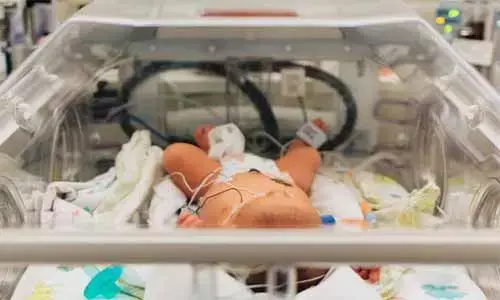- Home
- Medical news & Guidelines
- Anesthesiology
- Cardiology and CTVS
- Critical Care
- Dentistry
- Dermatology
- Diabetes and Endocrinology
- ENT
- Gastroenterology
- Medicine
- Nephrology
- Neurology
- Obstretics-Gynaecology
- Oncology
- Ophthalmology
- Orthopaedics
- Pediatrics-Neonatology
- Psychiatry
- Pulmonology
- Radiology
- Surgery
- Urology
- Laboratory Medicine
- Diet
- Nursing
- Paramedical
- Physiotherapy
- Health news
- Fact Check
- Bone Health Fact Check
- Brain Health Fact Check
- Cancer Related Fact Check
- Child Care Fact Check
- Dental and oral health fact check
- Diabetes and metabolic health fact check
- Diet and Nutrition Fact Check
- Eye and ENT Care Fact Check
- Fitness fact check
- Gut health fact check
- Heart health fact check
- Kidney health fact check
- Medical education fact check
- Men's health fact check
- Respiratory fact check
- Skin and hair care fact check
- Vaccine and Immunization fact check
- Women's health fact check
- AYUSH
- State News
- Andaman and Nicobar Islands
- Andhra Pradesh
- Arunachal Pradesh
- Assam
- Bihar
- Chandigarh
- Chattisgarh
- Dadra and Nagar Haveli
- Daman and Diu
- Delhi
- Goa
- Gujarat
- Haryana
- Himachal Pradesh
- Jammu & Kashmir
- Jharkhand
- Karnataka
- Kerala
- Ladakh
- Lakshadweep
- Madhya Pradesh
- Maharashtra
- Manipur
- Meghalaya
- Mizoram
- Nagaland
- Odisha
- Puducherry
- Punjab
- Rajasthan
- Sikkim
- Tamil Nadu
- Telangana
- Tripura
- Uttar Pradesh
- Uttrakhand
- West Bengal
- Medical Education
- Industry
Conservative management of PDA in low birth weight neonates doesn't increases mortality: Study

According to recent research, investigators have found that restrictive threshold for management of PDA in VLBW neonates may not be associated with an increase in morbidity or mortality, and possibly would reduce the need for pharmacological treatment or surgical ligation, as published in the Indian Pediatrics.
A hemodynamically significant patent ductus arteriosus (PDA) in preterm neonates is considered a risk factor for mortality, and morbidities such as bronchopulmonary dysplasia (BPD), necrotizing enterocolitis (NEC), and intraventricular hemorrhage (IVH). A causal relationship between PDA and these adverse outcomes; however, has not been established.
Recent observational studies suggest that PDA closes spontaneously in most preterm neonates and use of a conservative approach for its management does not result in an increase in morbidity or mortality. Hence, Manoj Modi and colleagues from the Department of Neonatology, Sir Ganga Ram Hospital, New Delhi, India carried out the present study to compare outcomes of very low birth weight (VLBW) neonates before and after the change in practice for the treatment of PDA.
The authors reviewed the medical records of VLBW neonates. Neonates were categorized into two groups: Period I (January 2012 to July 2015) and Period II (August 2015 to December 2016). The primary outcome of the study was a composite outcome of death or broncho-pulmonary dysplasia (BPD).
The following were the findings-
- The composite outcome (Death/BPD) was comparable in two groups; adjusted OR (95% CI) 1.1 (0.6, 1.9).
- Mortality and severe BPD was also comparable.
- The pharmacological treatment for PDA was required in 8.4% vs 2.6% of VLBW neonates during Period I and II, respectively (P=0.03).
- Durations of invasive and noninvasive ventilation were comparable during two periods.
Therefore, the authors concluded that "Restrictive threshold for management of PDA in VLBW neonates may not be associated with an increase in morbidities or mortality and possibly would reduce the need for pharmacological treatment or surgical ligation."
Dr. Nandita Mohan is a practicing pediatric dentist with more than 5 years of clinical work experience. Along with this, she is equally interested in keeping herself up to date about the latest developments in the field of medicine and dentistry which is the driving force for her to be in association with Medical Dialogues. She also has her name attached with many publications; both national and international. She has pursued her BDS from Rajiv Gandhi University of Health Sciences, Bangalore and later went to enter her dream specialty (MDS) in the Department of Pedodontics and Preventive Dentistry from Pt. B.D. Sharma University of Health Sciences. Through all the years of experience, her core interest in learning something new has never stopped. She can be contacted at editorial@medicaldialogues.in. Contact no. 011-43720751
Dr Kamal Kant Kohli-MBBS, DTCD- a chest specialist with more than 30 years of practice and a flair for writing clinical articles, Dr Kamal Kant Kohli joined Medical Dialogues as a Chief Editor of Medical News. Besides writing articles, as an editor, he proofreads and verifies all the medical content published on Medical Dialogues including those coming from journals, studies,medical conferences,guidelines etc. Email: drkohli@medicaldialogues.in. Contact no. 011-43720751


